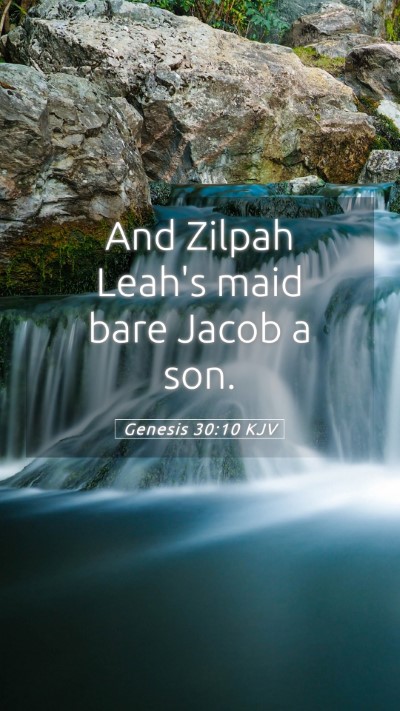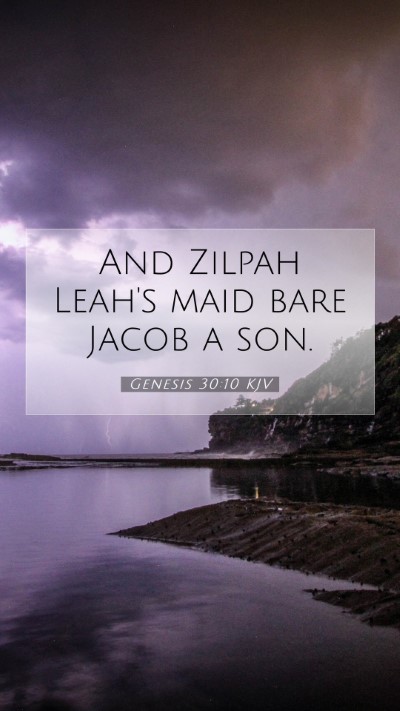Meaning and Interpretation of Genesis 30:10
Genesis 30:10 states: "And Leah’s maid Zilpah bore Jacob a son." This verse, while seemingly straightforward, invites deeper reflection and understanding in its biblical context.
Bible Verse Meanings
This verse refers to Leah, one of Jacob's wives, and her handmaid Zilpah, who bore Jacob children in a time when Leah was envious of her sister Rachel's ability to bear sons. The act of a maidservant bearing a child on behalf of her mistress was a cultural practice seen in the Ancient Near East, where women struggled with barrenness.
Bible Verse Interpretations
- Matthew Henry's Commentary: Henry explains that this event highlights the rivalry between Leah and Rachel, showing how Leah sought to gain Jacob’s affection through more children.
- Albert Barnes' Notes: Barnes interprets Zilpah's role in the narrative as significant, exploring the implications of surrogacy and the importance of lineage in Hebrew culture.
- Adam Clarke's Commentary: Clarke notes that the names of the sons born to Jacob during this period symbolize Leah's ongoing struggle for approval and love from Jacob.
Understanding Scripture within Context
The account of Zilpah giving birth can be understood as part of a larger narrative surrounding Jacob's family dynamics. The competition between Leah and Rachel led to the use of their handmaidens as surrogates, a practice that reflects their desperation and societal norms of the time.
Bible Verse Explanations
Genesis 30:10 serves as an illustration of the lengths to which Leah would go to feel valued and loved. It reflects human emotions such as jealousy, competition, and the longing for acceptance, which are still relevant in personal relationships today.
Biblical Exegesis of Genesis 30:10
The broader context of Genesis reveals a complex family structure that challenges our understanding of relationships and fidelity within the patriarchal narratives. Zilpah's son represents not only another addition to Jacob's family but also the continuation of the lineage, which is a vital aspect of biblical history.
Key Themes and Insights
- Jealousy and Rivalry: This verse encapsulates the ongoing tension between Leah and Rachel.
- Gender Dynamics: The role of Zilpah speaks to the expectations and experiences of women during ancient times.
- Faith and Providence: The narrative also invites reflection on God's presence and guidance even in challenging familial situations.
Cross References
- Genesis 29:31-35: The birth of Leah's first children illustrates her desire for Jacob’s love.
- Genesis 30:1-3: Rachel’s desperation leads to her offering Bilhah to Jacob.
- Exodus 1:15-22: The plight and roles of women in the context of childbirth echo through different biblical narratives.
Bible Study Insights
When studying Genesis 30:10, consider how this verse can inform your understanding of human relationships and struggles for recognition. Engaging with this passage can deepen your appreciation of the historical and cultural context of the Bible.
Applications in Daily Life
This verse encourages us to reflect on our interpersonal dynamics—whether in competition with others or seeking validation in our relationships. The complexities of family and love in the Bible serve as a mirror to our own experiences.


